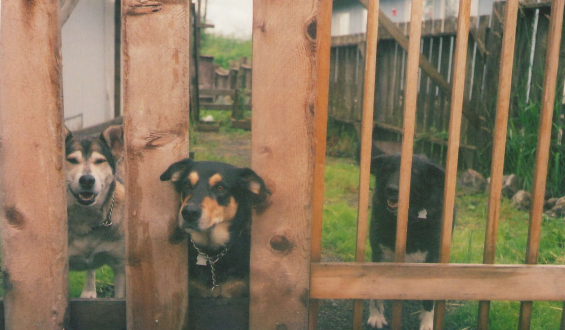My dog Bandit was, in the vernacular of my people, “a caution.” I imagine that this term is related to the phrase “a cautionary tale,” which means, “listen while I tell you what this person did, and then go do something, anything, except that.” And truly, dear Bandit did many things that I would not recommend.
There was that time when she and her sister Koosh were riding in the back of our truck, and I threw an orange peel out of the window; fortunately, we had only gotten up to about 25 miles an hour when Bandit jumped out in pursuit of said peel. We had gone several miles before we missed her, but when we came back, we found her waiting by the road, looking sheepish but uninjured. Apparently, she had a rare talent for the tuck-and-roll procedure.
Bandit often tried to hide things that she wanted to keep to herself, and she did a routinely poor job of it. Once when someone gave her a milk bone, she placed it on the living room carpet, and pushed an empty VHS case and a work glove around it, situated so that the milk bone stood up on end. Sister Koosh took one look, swooped in, grabbed that milk bone and skedaddled before Bandit had a chance to react.
And, even though Bandit was the most loving pet a human could ask for, she tried to dominate other dogs. Periodically, she would ferociously attack her sister Boots; and although Boots was much older and smaller, she always managed to latch on to a lip or something and draw quite a bit of blood. As mentally quick as Bandit was (the time between when she and Koosh would decide to bolt and when they would do it was usually less than a millisecond, and they would both make sure to glean the utmost possible joy from their ensuing period of freedom), she continued the above-described behaviors and many others, throughout her entire life, regardless of the consequences. We loved her anyway.
I must admit, however, that there was one area in which I truly admired Bandit’s approach. She and her sisters spent a lot of time in the house, and as such we tried to keep them bathed and brushed. Brushing was fine; Bandit didn’t mind a bit—although it never made the slightest difference in the amount of shedding that went on.
A bath was a different story. None of the three girls liked having a bath, but Bandit’s approach to avoiding the horror was interesting. When she heard the bathtub running and felt herself being herded in the direction of the sound, she would dig in her heels. Please understand that Bandit was a husky mix and weighed close to seventy-five pounds; and know that when attacking other dogs, she made good use of her teeth and her growl. She could have tried a similar approach when being urged bath-ward by her humans, but she never did. When trying to avoid being muscled into the tub, she never snapped or raised her voice; she just devoted every ounce of her strength, agility, and mental energy to staying out of the tub.
It seems like an approach to emulate. When faced with a difficult situation, we might all do well to avoid the sound and the fury as much as possible and concentrate instead on quietly, might I say doggedly, staying the course.

Concerning your last paragraph about quiet over growl, I am reminded of the five of us kids growing up together and being made to eat vegetables we did not want. Those of us who made a fuss had a parent standing by making sure we ate the vegetable, I, on the other hand, would quietly move my vegetable around on the plate, making it look like I had eaten some.
Another example of your quiet brilliance. While I was making a federal case out of Great Northern Beans, you were maybe hiding yours in your pockets for later disposal? I’ve often wondered about okra, the one vegetable that was too gross for even our mother.
Yes, that is what I was doing.
Speaking of okra, maybe that is one of the foods that was eaten by starving people, and then became a delicacy. I am being serious about this, I had a friend from a country where hunger had been the norm, and now when better times came and this was no longer the case, these strange foods became highly priced delicacies.
I recall reading something about that about Maine lobster–used to be the fare of poor families. And then, having been tested by them, it became a fan favorite. Most interesting!
And those are three lovely ladies!
Yes, they are!